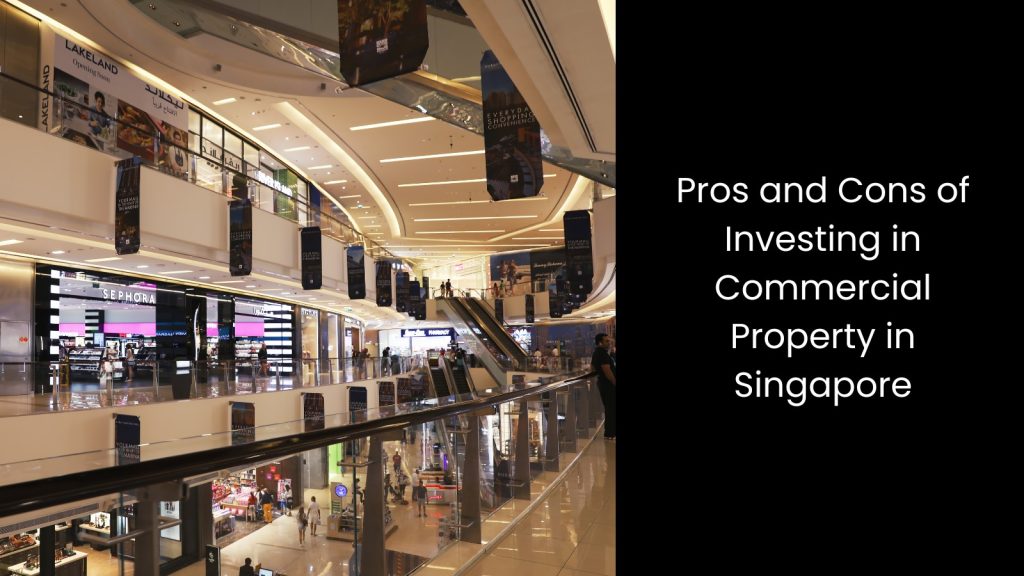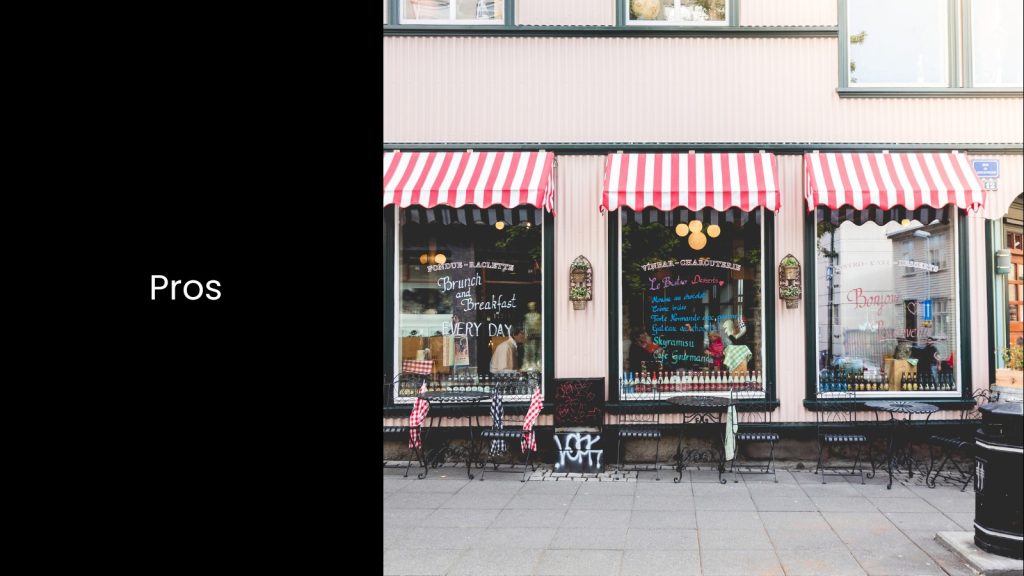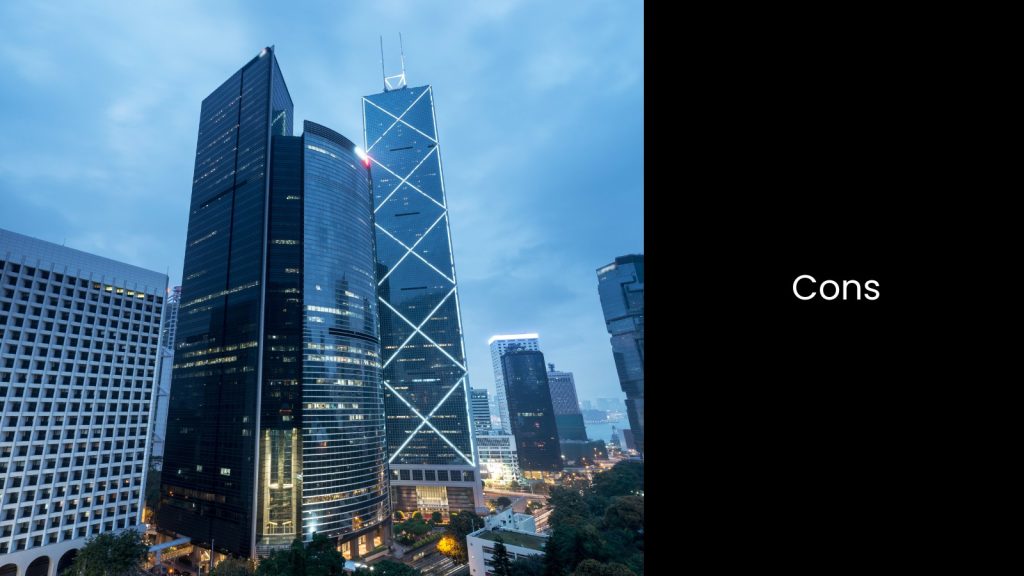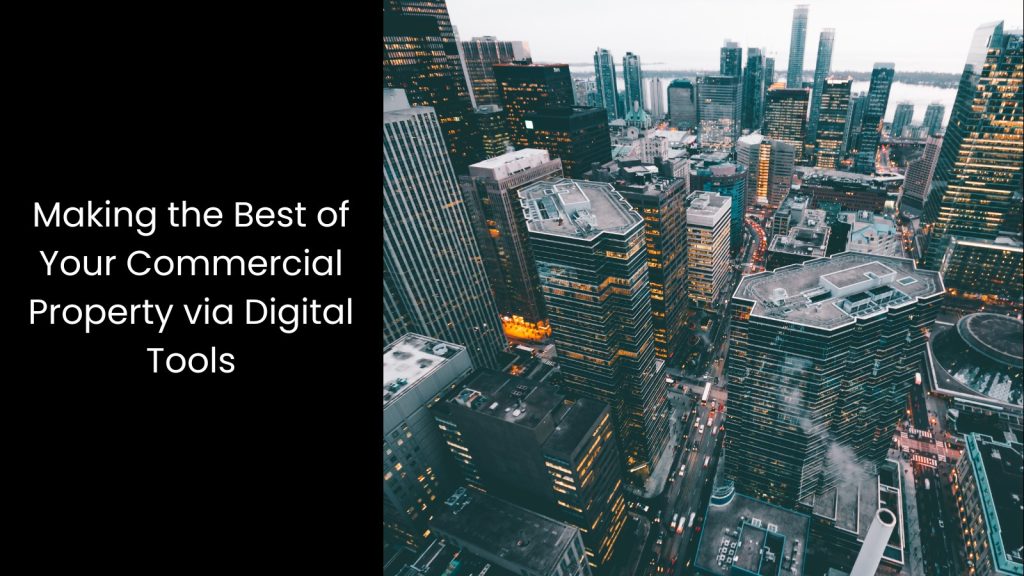Imagine standing in the heart of Singapore and dreaming of the ways you earn by investing in commercial property! It is indeed true that your commercial property can be lured by the promise of steady income and long-term gains. However, you must not forget that the Lion’s City’s landscape presents challenges that make you pause. You may see an opportunity as an opened door, but it may actually be a dark room in the long run. So, is commercial property a good investment or not?
You will find your answer throughout this article, where we explain the pros and cons of investing in a commercial property in Singapore.
We will know
Pros and Cons of Investing in Commercial Property in Singapore

In the below section, we are digging deep into exploring the good side and the dark side of commercial property investment, especially in Singapore.
Pros

Diverse Tenant Base
This is a significant advantage when investing in commercial property in Singapore, as it increases the stability and potential profitability of the investment.
You know that Singapore’s diverse economy attracts various businesses, giving investors access to a wide range of potential tenants across different industries. This diversity reduces reliance on a single industry or sector, spreading the risk in case one sector faces an economic downturn.
When attracting tenants from industries like banking, logistics, healthcare, and retail, investors can ensure more consistent occupancy rates. In a business land like Singapore, the demand for commercial spaces comes from both multinational corporations and small local businesses. This broad demand creates a robust rental market and provides property owners with flexibility when choosing tenants.
Moreover, having tenants from different industries offers more negotiating power and adaptability during lease agreements, as each business may have different requirements. A diverse tenant base not only helps reduce vacancy periods but also contributes to long-term property value growth, making commercial property investment in Singapore a more secure and profitable option.
Economic Stability
Singapore has a strong, stable economy supported by sound financial systems, good governance, and a transparent legal framework. This economic stability reduces the risks associated with property investments, giving investors more confidence in their long-term prospects.
Plus, investors benefit from a business-friendly environment, where low corruption levels and clear regulations create a safe and predictable market for commercial real estate. The stable economy ensures that businesses operating in Singapore, from multinational corporations to local enterprises, continue to succeed and generate demand for office, retail, and industrial spaces.
A stable economy also means consistent demand for commercial properties, leading to steady rental income and reducing the likelihood of significant downturns in property values.
Higher Rental Yields
This is indeed a major advantage of investing in commercial property in Singapore.
The reason is they offer greater returns compared to residential properties. Commercial properties, such as offices, retail spaces, and industrial units, generally produce higher rental income because businesses are willing to pay more for spaces that meet their needs. Singapore’s status as a global business hub, combined with its strategic location in Asia, attracts multinational corporations and growing local enterprises, driving demand for commercial spaces, as we mentioned before.
With this high demand, commercial property owners can charge premium rents, especially in prime business areas. Additionally, businesses often sign long-term leases, which ensure steady rental income over time and reduce turnover costs for the investor. Unlike residential properties, where rent prices can be influenced by market saturation or government regulations, commercial properties offer greater flexibility in pricing.
Less Maintenance
This kind of investment reduces the time, effort, and costs associated with property upkeep. Did you notice this?
In commercial leases, tenants usually take responsibility for maintaining the interior of the premises as part of their business operations. This includes areas such as fixtures, fittings, and any necessary repairs, which shifts much of the maintenance burden away from the property owner. In contrast, residential properties typically require the landlord to handle most repairs and maintenance, which can be costly and time-consuming.
So, when investing in commercial properties, owners can focus more on managing their portfolios and maximising returns rather than dealing with frequent maintenance issues.
Longer Lease Terms
Commercial tenants, such as businesses, usually commit to longer lease agreements, and this ranges from three to ten years, compared to residential leases, which typically last one or two years. This longer commitment ensures a steady stream of rental income over an extended period, reducing the risks associated with frequent tenant turnover.
With fewer vacancies to worry about, investors can save on marketing costs and avoid the disruption of finding new tenants.
Additionally, longer leases offer greater security, as businesses are more likely to stay in a location that supports their operations, especially in Singapore’s thriving commercial hubs. This allows investors to plan more effectively for long-term financial goals.
Cons

Complexity in Management
This point becomes a downside of investing in commercial property in Singapore because it requires more expertise and effort than managing residential properties. It is indeed interesting to identify how this occurs.
Commercial properties involve dealing with various legal, regulatory, and operational aspects that can be challenging for investors. For example, commercial leases often come with detailed contracts that outline specific tenant obligations, such as maintenance responsibilities, zoning regulations, and usage restrictions.
Navigating these legal complexities requires a deep understanding of commercial property laws and often involves working with legal professionals, which adds to the management burden. Additionally, businesses renting commercial spaces may have specific needs, such as customisation of the property for their operations, which adds another layer of complexity in terms of meeting tenant demands. Managing commercial properties also involves coordinating with multiple tenants if the building is shared, each having different requirements and schedules. This adds to the administrative workload and can make the management process more time-consuming.
Economic Fluctuations
When the economy is strong, businesses keep blooming, and demand for commercial spaces increases, leading to higher rental income and occupancy rates. Do you agree?
However, during economic downturns or global recessions, many businesses may downsize, relocate, or close, reducing the demand for commercial spaces. This can result in higher vacancy rates and longer periods without tenants, causing a drop in rental income for property owners.
Investors in commercial property are more exposed to the effects of economic cycles because businesses are directly impacted by market conditions, such as consumer spending, global trade, and financial stability. Singapore, despite its strong economy, is not immune to these fluctuations due to its reliance on international trade and tourism.
Higher Initial Costs
Commercial property investment requires a significant amount of upfront capital, making it more difficult for some investors to enter the market.
The purchase price of commercial properties is generally much higher than residential properties, especially in Singapore’s prime business districts, where demand is strong and prices are driven up.
In addition to the high purchase price, investors need to consider other expenses such as legal fees, stamp duties, and renovation costs, which add to the overall investment amount. Securing financing for commercial properties can also be more challenging, as banks often require larger down payments and offer stricter loan terms for commercial real estate. The high initial costs also include property taxes and insurance, which are typically higher for commercial properties than for residential ones.
Market Saturation Risk
As more investors enter the commercial real estate market, they may build new properties or convert existing spaces into commercial units. The latter can saturate certain areas, particularly in popular business districts.
When the supply of commercial spaces exceeds the demand, property owners face challenges in attracting and retaining tenants. This saturation can lead to higher vacancy rates, forcing landlords to lower rents to fill empty spaces, which directly impacts their overall income and profitability.
Moreover, in highly saturated markets, businesses have more options, allowing them to negotiate better lease terms or seek out more favourable locations, further driving down rental prices. Investors will also struggle to maintain property values in a saturated market, as the influx of competing properties can lead to declining property appreciation.
This risk becomes particularly pronounced during economic downturns when businesses are more cautious about their space requirements and may choose to downsize or relocate.
Prolonged Vacancy Periods
You must keep in mind that this can severely impact an investor’s cash flow and overall profitability. This is why you should know how this would occur.
When a commercial space remains vacant for an extended time, the property owner does not receive any rental income. No need to say that this will create financial strain, especially considering the high initial costs associated with commercial properties.
Property owners must continue to cover expenses such as mortgage payments, property taxes, insurance, and maintenance costs, even without any rental income. This situation can lead to financial losses, forcing some investors to sell their properties at unfavourable prices or to dip into personal savings to cover the ongoing costs.
Additionally, prolonged vacancies can signal to potential tenants that a property is undesirable or that the area is struggling, further discouraging new tenants from signing leases. This creates a vicious cycle, where the longer a property remains vacant, the harder it becomes to attract tenants.
Prolonged Vacancy Periods

Since you have gone through this article, you know that each coin has two sides, like commercial property investment in Singapore, which has pros and cons. It is totally up to you to decide whether you go for this investment. What we must remind you is that you can always employ a robust Business Intelligence system from a reputed partner to estimate a commercial property’s value after 10–15 years. You are going to receive accurate predictions as this process involves a systematic approach that leverages data analysis, predictive modelling, and market insights. With the right tools, your investment journey will be smooth.

